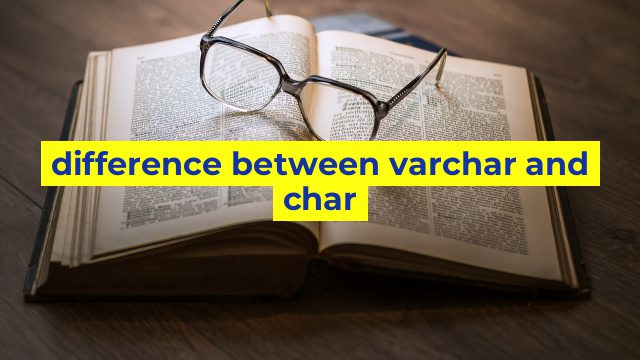Difference between Varchar and Char in SQL
When working with SQL databases, you may come across two similar data types – Varchar and Char. They both are used to store text data but there is a significant difference between the two. In this article, we will explore the differences between Varchar and Char and how they impact your database design.
What is Char?
Char is a data type used in SQL that is used to store fixed-length character strings. The length of the string is fixed and specified when the table is created. For example, if you define a table column as CHAR(10), it means that it will store a string of 10 characters, no matter what. If you try to insert a shorter string, the database will fill the remaining spaces with blank spaces, and if you try to insert a longer string, it will be truncated to fit the specified length.
The advantage of using Char is that it saves space and speeds up querying if the length of the string is fixed, which means that the database does not have to store and retrieve extra bytes to indicate the length of the string. However, if the length of the strings varies, it may cause unnecessary waste of space.
What is Varchar?
Varchar stands for variable-length character string. As the name suggests, Varchar allows you to store strings of varying lengths. Unlike Char, there is no need to specify the length of the string when creating a table column. When you insert a string into a Varchar column, the database will only take up the amount of space needed to store the string. This means that Varchar can be more space-saving than Char, especially when dealing with variable-length strings.
However, storing variable-length strings using Varchar may affect the performance of the database, as the database has to store and retrieve extra bytes to indicate the length of the string. Therefore, using Varchar for fixed-length strings can result in slower query performance than using Char.
When to use Char and Varchar?
The choice between Char and Varchar depends on the specific needs of your application. If you know that the length of the string will remain fixed or if performance is a concern, then Char is the better option. On the other hand, if you are dealing with variable-length strings or if space-saving is a concern, then Varchar is the better option.
In conclusion, Char and Varchar are both useful data types, but they have different use cases. Understanding the differences between them will help you make an informed decision when designing your database schema.
Table difference between varchar and char
| Difference between VARCHAR and CHAR |
|---|
| VARCHAR |
| VARCHAR stands for variable-length character data type. |
| The length of data can be variable up to a maximum limit, defined during its creation. |
| It occupies only the required space for the data entered. |
| It is generally used for storing data that can vary in length, such as names, addresses, or descriptions. |
| CHAR |
| CHAR stands for fixed-length character data type. |
| The length of data is fixed and defined during its creation. |
| It occupies the entire space specified, including any unused space. |
| It is generally used for storing data that has a fixed length, such as zip codes, phone numbers, or social security numbers. |


